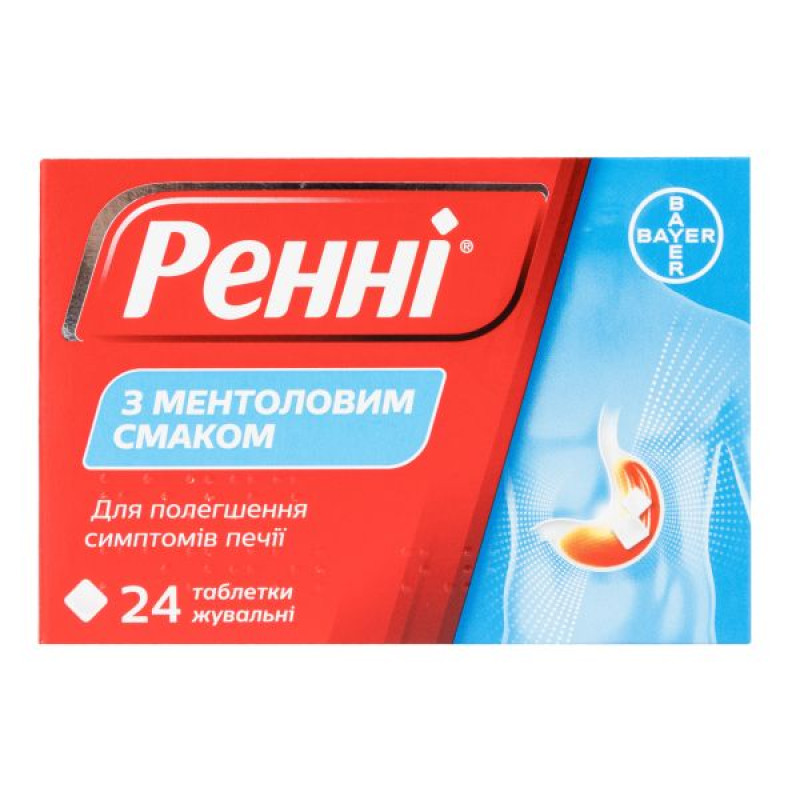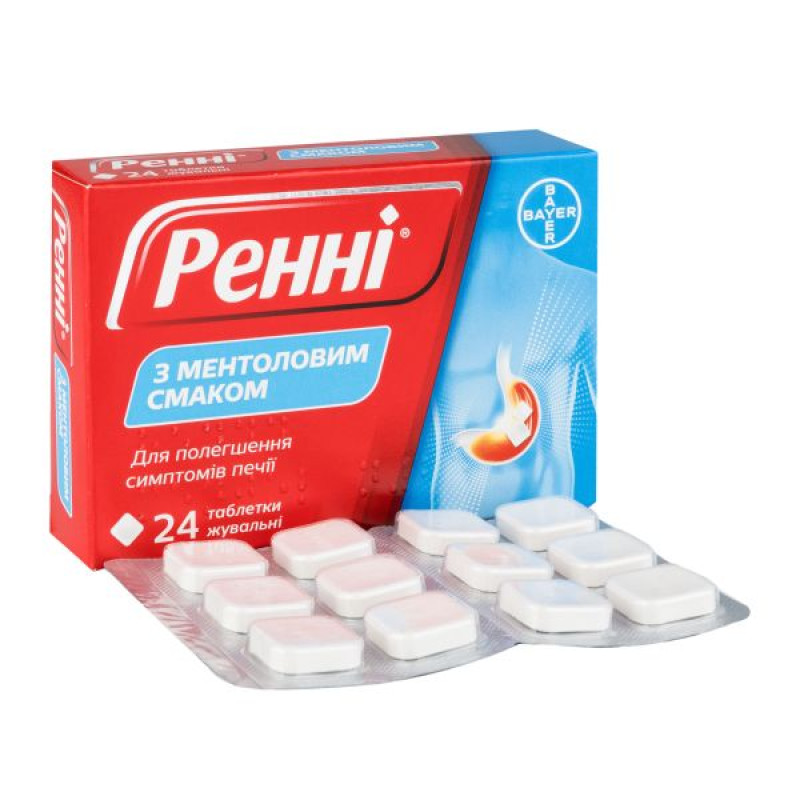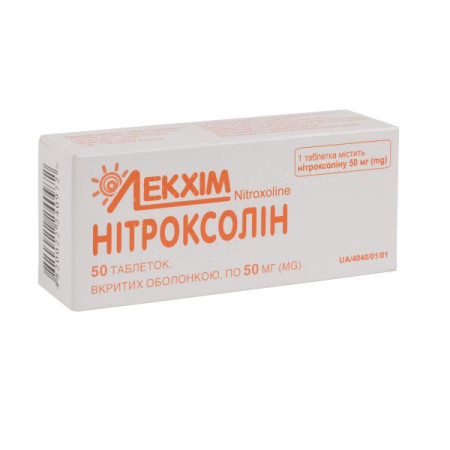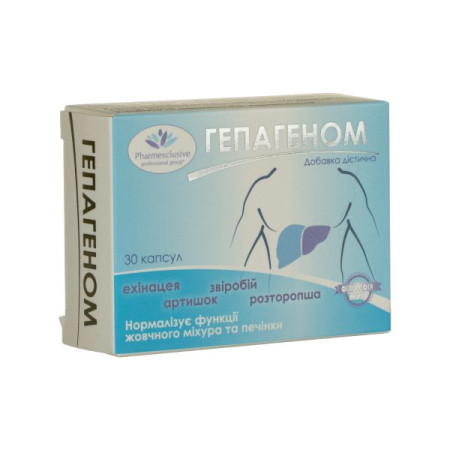Rennie with menthol flavor chewable tablets blister No. 24

Instructions for Rennie menthol-flavored chewable tablets blister pack No. 24
Composition
active ingredients: calcium carbonate, magnesium carbonate;
1 tablet contains 680 mg of calcium carbonate (272 mg of elemental calcium) and 80 mg of heavy magnesium carbonate;
excipients: sucrose, pregelatinized corn starch, potato starch, talc, magnesium stearate, light mineral oil, mint flavoring, lemon flavoring.
Dosage form
Chewable tablets.
Main physicochemical properties: creamy-white square tablets with concave surfaces, engraved with the inscription "RENNIE" on both sides, with a menthol odor.
Pharmacotherapeutic group
Antacids, other combinations. ATX code A02A X.
Pharmacological properties
Pharmacodynamics.
Rennie® menthol flavoured is a combination of two antacids: calcium carbonate and magnesium carbonate, which have a local effect by neutralising stomach acid, independent of systemic absorption. Calcium carbonate has a long-lasting and strong neutralising activity. This effect is enhanced by magnesium carbonate, which also has a strong neutralising activity.
The total neutralizing capacity of the drug in vitro is 16 mEq H+ (titration to an end point of pH 2.5).
In vitro acid neutralization studies (artificial stomach model) have shown that Rennie® menthol-flavored increases gastric pH from 1.5-2 to 3 in 40 seconds, and pH 4 can be reached in 1 minute 13 seconds. The maximum pH reached in the model was 5.24.
Pharmacokinetics.
In the stomach, calcium carbonate and magnesium carbonate react with gastric juice to form water and soluble mineral salts.
CaCO3 + 2HCl → CaCl2 + H2O + CO2
MgCO3 + 2HCl → MgCl2 + H2O + CO2
Calcium and magnesium can be absorbed in the form of their soluble salts. The level of absorption of calcium and magnesium from these compounds depends on the dose of the drug. The maximum level of absorption is 10% of calcium and 15–20% of magnesium. In healthy volunteers, a small amount of absorbed calcium and magnesium is excreted by the kidneys. If their function is impaired, the concentration of calcium and magnesium in the blood plasma may increase. During digestion in the intestine, insoluble compounds are formed from soluble salts, which are excreted in the feces.
Preclinical studies of Rennie® medicinal products have not been conducted. The available preclinical data on calcium carbonate and magnesium carbonate (repeated dose toxicity, genotoxicity and/or carcinogenic potential, reproductive toxicity data in rodents) described in the scientific literature do not contain information additional to that provided in other sections of the instructions.
Indication
Adults and children aged 15 years and over to relieve symptoms associated with increased gastric acidity (e.g. heartburn, gastroesophageal reflux) leading to indigestion and dyspepsia.
Contraindication
- Increased individual sensitivity to the components of the drug;
- hypercalcemia and/or conditions leading to hypercalcemia;
- nephrolithiasis, caused by the deposition of stones containing calcium;
- severe renal failure (creatinine clearance below 30 ml/min);
- hypophosphatemia.
Interaction with other medicinal products and other types of interactions
It is recommended to take other medications 1–2 hours before or after taking Rennie® with menthol flavor.
Since there is a decrease in the gastrointestinal absorption of some drugs used simultaneously, as a precautionary measure, a 2-hour interval should be observed when using Rennie® with menthol flavor with acetylsalicylic acid, estramustine, H2-antisecretory antihistamines, atenolol, metoprolol or propanolol, chloroquine, diflunisal, digoxin, diphosphonates, fexofenadine, glucocorticoids (prednisolone and dexamethasone, except for hydrocortisone in replacement therapy), indomethacin, ketoconazole, phenothiazid neuroleptics, penicillamine, thyroid hormones (thyroxine), ethambutol, isoniazid, lansoprazole, sulpiride, cyclins.
Changes in gastric acidity, for example during treatment with antacids, may impair the rate and extent of absorption of other drugs if they are taken simultaneously. In the case of simultaneous use of Rennie® with menthol flavor with antibiotics (tetracyclines, quinolones, lincosamides) and cardiac glycosides (digoxin), bisphosphonates, dolutegravir (antacid should be administered either 2 hours after taking dolutegravir or 6 hours before it), phosphorus, strontium and zinc compounds, levothyroxine and eltrombopag, the absorption of the latter is reduced.
Thiazide diuretics reduce urinary calcium excretion and increase serum calcium levels. Due to the increased risk of hypercalcemia, serum calcium levels should be monitored regularly during concomitant use of thiazide diuretics.
Calcium salts reduce the absorption of fluoride and iron-containing agents, and calcium salts and magnesium salts can interfere with the absorption of phosphates.
Sodium sulfonate – cationic ion exchange resin: the ability of the resin to bind potassium is reduced, which leads to the risk of developing metabolic alkalosis in renal failure.
Application features
If symptoms persist, partially persist or worsen after 10 days of treatment, an examination should be performed to clarify their nature and review the treatment regimen. The course of treatment with Rennie® should not exceed 10 days. Adverse reactions have been observed with simultaneous use with thiazide diuretics (see section "Interaction with other medicinal products and other types of interactions"). Long-term use of the drug in high doses may lead to the appearance of adverse reactions such as hypercalcemia, hypermagnesemia and milk-alkali syndrome, especially in patients with renal failure. The drug should not be taken simultaneously with large amounts of milk or dairy products. Long-term use of Rennie® may increase the risk of kidney stones. When using 4 to 5 tablets per day, the course of treatment should be short, treatment should be stopped immediately after the symptoms disappear.
It is recommended to consult a doctor in case of: weight loss, problems with swallowing or a constant feeling of discomfort in the abdomen, signs of digestive disorders, if they appear for the first time or have changed their nature, kidney failure (it is necessary to monitor calcium and magnesium levels).
Calcium carbonate and magnesium carbonate should not be used in hypercalciuria. This drug should be used with caution in patients with impaired renal function. If calcium carbonate and magnesium carbonate must be used in such patients, regular monitoring of plasma calcium, phosphorus, and magnesium levels is necessary.
Patients with hereditary fructose intolerance, glucose-galactose malabsorption or sucrase-isomaltase insufficiency should not use this medicine as it contains 475 mg of sucrose. This should also be taken into account by patients with diabetes mellitus.
Use during pregnancy or breastfeeding
Pregnancy
Animal studies do not indicate direct or indirect harmful effects with respect to reproductive function.
To date, no specific congenital defects or fetotoxic effects have been observed in clinical practice with the use of calcium carbonate and magnesium carbonate at recommended doses. However, observations of the course of pregnancy with the use of this combination are insufficient to exclude all risks.
It should be borne in mind that the presence of magnesium salts can cause diarrhea, and the presence of calcium in high doses used for a long time increases the risk of hypercalcemia with calcification of various organs, including the kidneys. Rennie® with menthol flavor should be used during pregnancy only if necessary.
It should also be noted that during pregnancy or breastfeeding, calcium carbonate and magnesium carbonate provide a significant amount of calcium in addition to the amount that comes from food.
To prevent calcium overload, do not exceed the maximum recommended daily dose of Rennie® with menthol flavor, limit the use of Rennie® with menthol flavor to 1 week, and while using the drug, avoid constant consumption of milk (1 liter contains up to 1.2 g of elemental calcium), as well as dairy products to prevent excess calcium, which can lead to the so-called milk-alkali syndrome (Burnet syndrome), which is a rare but serious disease that requires medical attention.
Lactation
Calcium and magnesium are excreted in breast milk, but when using therapeutic doses of Rennie® menthol-flavored, no effects on breastfed newborns/infants are expected.
Breastfeeding is possible while using this medicine if used as directed, but prolonged use of high doses should be avoided.
Fertility
There is no information on the effect of the drug on fertility.
Ability to influence reaction speed when driving vehicles or other mechanisms
No effect.
Method of administration and doses
A drug for oral use in adults and children over 15 years of age.
1–2 chewable tablets as a single dose, dissolve or chew 1 hour after eating or when pain or heartburn occurs, or before bedtime.
The dose can be increased for a short period to 5 tablets per day.
The duration of treatment should not exceed 10 days (see section "Special instructions").
Children.
Do not use in children under 15 years of age.
Overdose
Prolonged use of high doses of calcium carbonate and magnesium carbonate, especially in patients with renal insufficiency, may lead to hypermagnesemia, hypercalcemia and alkalosis, manifested by gastrointestinal symptoms (nausea, vomiting, diarrhea or constipation) and muscle weakness. In these cases, the drug should be discontinued and adequate fluid intake should be ensured. In severe cases of overdose (e.g., Burnett syndrome), additional rehydration measures (infusion) may be required.
Side effects
From the immune system.
Hypersensitivity reactions have been reported very rarely, manifesting as rash, urticaria, pruritus, angioedema, dyspnea and anaphylaxis.
Metabolic and nutritional disorders.
In patients, especially with impaired renal function, prolonged use of high doses may lead to hypermagnesemia (when using antacids containing magnesium) or hypercalcemia and alkalosis, which manifests itself in the form of gastric symptoms and muscle weakness, there is also a risk of kidney stones and the development of renal failure.
From the gastrointestinal tract.
Nausea, vomiting, stomach discomfort, constipation, and diarrhea may occur.
Musculoskeletal and connective tissue disorders.
Muscle weakness is possible.
Side effects observed only in milk-alkali syndrome (Burnett syndrome):
- gastrointestinal disorders (ageusia);
- general disorders (calcinosis and asthenia);
- nervous system disorders (headache);
- kidney and urinary tract disorders (azotemia).
Reporting adverse reactions after the registration of a medicinal product is important. This allows monitoring of the benefit/risk ratio of the medicinal product. Medical and pharmaceutical professionals, as well as patients or their legal representatives, should report all cases of suspected adverse reactions and lack of efficacy of the medicinal product via the Automated Information System for Pharmacovigilance at the link: https://aisf.dec.gov.ua.
Expiration date
5 years.
Storage conditions
Store in original packaging at a temperature not exceeding 25 ºС.
Keep out of reach of children.
Packaging
6 tablets in PVC and aluminum blisters, 2 or 4 blisters in a cardboard box, or 12 tablets in PVC and aluminum perforated blisters, 1 or 2 blisters in a cardboard box.
Vacation category
Without a prescription.
Producer
Delfarm Gaillard /
Delpharm Gaillard
Location of the manufacturer and its business address.
33 Rue Industrie, 74240, Gaillard, France /
33 rue de l'Industrie, 74240, Gaillard, France
There are no reviews for this product.
There are no reviews for this product, be the first to leave your review.
No questions about this product, be the first and ask your question.


















